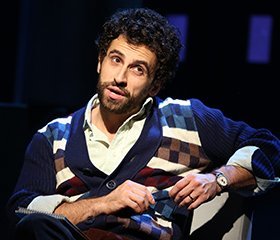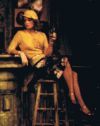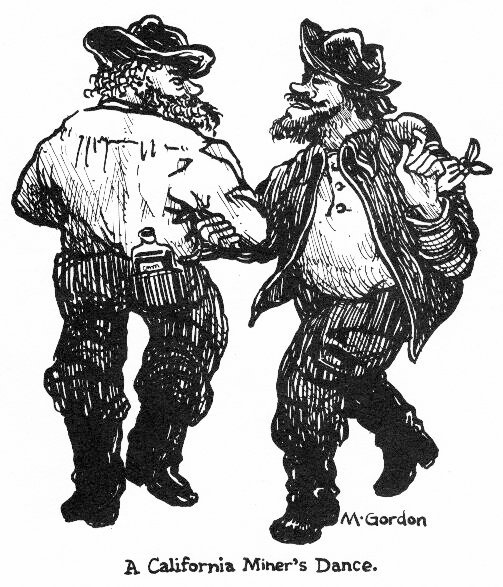Grey Gardens Question
#1Grey Gardens Question
Posted: 6/25/07 at 11:49pmI was wondering how the songs "Hominy Grits", "The House we Live in", and "Choose to be Happy" fit into the context of the show. Unfortunately I have not had a chance to see the show yet, but love the recording, although I cannot seem to figure out how these songs fit into the show. Sorry for asking what is probably a pretty obvious question. Thanks!
#2re: Grey Gardens Question
Posted: 6/25/07 at 11:53pmI've only seen the show once so I'll try to answer this as best as possible. "Hominy Grits" is a song Big Edie is rehearsing in act one. "The House We Live In" is performed by Little Edie in act two to show Jerry how she likes to perform (or something of that nature) and "Choose to Be Happy" is a song on the radio in act two.
#2re: Grey Gardens Question
Posted: 6/25/07 at 11:54pm
Its not an obvious question if you are not familiar with the documentary or individuals on which the show is based. "The House We Live In" is a record that Little Edie puts on and "marches" and dances to. Its hinted at in the documentary when she plays various marching songs and begins to march and dance. She also struts her stuff on the front porch saying that she practiced all night and her legs are "gone"! "Choose to be Happy" is inspired by the women's devotion to Dr. Norman Vincent Peale, a preacher who had a saying "try, really try, think really think, believe really believe" and would preach this on his radio broadcasts. The point of "Hominy Grits" in my opinion is to show how aventgarde (sp?) Big Edie is at a time when (in 1941) segragation was very much alive and well in the south and for her to be singing as a black person was not only controversial for anyone but for someone of her social status as well.
Hope that helps!
#3re: Grey Gardens Question
Posted: 6/26/07 at 12:06amThank You both soooooo much!!! I kind of guessed at a little of that, but this really cleared it up! I really NEED to see this show
#4re: Grey Gardens Question
Posted: 6/26/07 at 12:10am
See the show but check out the documentary either before or afterwards. It doesn't matter when you see it as long as you see it. Its brillant, honestly! ![]()
#5re: Grey Gardens Question
Posted: 6/26/07 at 12:16am
Honestly? The most brilliant? Does that include Mr. Bouvier and Mr. Beale? ![]()
#6re: Grey Gardens Question
Posted: 6/26/07 at 12:21am
HAHAHA!
"Isn't it awful when a dancer gets fat? Isn't it awful? God. It's awful, I'm telling you. It's awful! God!"
"Edie: My God, my muscles! I can’t do it, I’m telling you! What am I gonna do?! They’re gone! With this soft life. (Laughs.) “We all march together for love is behind, we all stand together, united we die. We all march together, for we love the land, it’s the spirit of V.M.I.! We all march together, for life is unkind...” (Laughs.) When they do that (hand motion), that’s when the plane goes by, see? So I’m doing the V.M.I. marching song which is a ground maneuver. Anyway, I’ve got to get it all coordinated in my mind!"
Edie: shall I tell them about Gould? Gould was Mother’s accompanist. He was a boogie-woogie composer who had the most terrific style.
Edith: He was the most brilliant man I’ve ever met, that’s including Mr. Beale and Mr. Bouvier. Completely brilliant.
Edie: This is cute, Mother. I like that very much. Don’t you, David?
#7re: Grey Gardens Question
Posted: 6/26/07 at 12:37amEverytime I say "absolutely" I now have to repeat after it "OB-solutely."
#8re: Grey Gardens Question
Posted: 6/26/07 at 7:52amI agree with most of your descriptions, but I'm not sure about "Hominy Grits." I thought it was supposed to illustrate that Big Edie *wants* to be progressive and avant-garde, but really doesn't have a clue about what that means, because that song (and the other one she's rehearsing, "Itty Bitty Geisha") are so incredibly racist. I don't think any real black person would ever have sung a song like "Hominy Grits." Or am I missing something?
#9re: Grey Gardens Question
Posted: 6/26/07 at 8:33am
**SPOILERS**
Some further thoughts on "Choose to be Happy." On the heels of "Around the World," the Edies have their big climactic argument. Edie Storms out of the room leaving Big Edie listening to Norman Vincent Peele on the radio. "Choose to be Happy" begins. For the first half of the song we see Big Edie sitting in bed listening to it. This is meant to show her reflecting on the reality of her life and what's just happened. Then her bedroom rotates away and we watch Little Edie for the second half of the song as she packs her suitcase, working through her resolve to actually make the move to leave. Very effective.
This is connected to one of the most powerful moments in the documentary. In the documentary, the two Edies sit on their respective beds and listen to Mr. Peele's sermon on the radio. The sermon is similar to the theme of the song, try really try, etc. The scene closes out with a close-up of Big Edie as she listens. You can see the tears well up in her eyes as she relates the sermon to her own life/situation.
It's powerful because up until that point she mainly carries on as if she really believes she's still grand and at a tea party, acting regal and ordering people about. You have the impression she just thinks things are like they are because she has a servant problem. Then at the end of the sermon you see that moment where it all breaks through her denial and you see her recognition of what her life really is. It's probably not the first time this has broken through to her but it's powerful to see nonetheless.
While I love how the song is used in the play, I found myself wishing they had stayed with Big Edie throughout and been more true to that moment.
#10re: Grey Gardens Question
Posted: 6/26/07 at 8:52amThe other thing that is important about "Hominy Grits" is that Big Edie singing it and having her nieces dance along so upsets her father that he finally gives up on her and takes away her trust fund. (The money tree comes down with elm disease.)
#11re: Grey Gardens Question
Posted: 6/26/07 at 9:18am
Hominy Grits is supposed to show how 'outlandish' and inappropriate Big Edie was and the effects it had-alienating her family, etc.
It also shows how she likes the spotlight. And, it nicely sets up the argument with her father.
Choose to be Happy is actually effective because we see both women struggling internally with their own station in life at that point. (It's inspiring to Little Edie until the next scene.)
As for "The House We Live In," there is a comparable scene in the documentary and it gives us a hint of what Edie may actually have had in the way of talent. (not much of an indicator though) It also demonstrates her own longing for attention and her own desires to be on the stage. (as well as her outlandish behavior)
rasputin1963
Swing Joined: 2/19/20
#12re: Grey Gardens Question
Posted: 2/19/20 at 4:51am
Watching the 1975 documentary yet again tonight. I am mystified by the lyrics Little Edie sings to what she calls "The VMI Marching Song". There is a "VMI Spirit Song" you can hear on YouTube, but it does not contain the lyrics Little Edie is singing... I wonder if she is making up those lyrics?
#13re: Grey Gardens Question
Posted: 2/19/20 at 8:14pm
karen24 said: "I agree with most of your descriptions, but I'm not sure about "Hominy Grits." I thought it was supposed to illustrate that Big Edie *wants* to be progressive and avant-garde, but really doesn't have a clue about what that means, because that song (and the other one she's rehearsing, "Itty Bitty Geisha"![]() are so incredibly racist. I don't think any real black person would ever have sung a song like "Hominy Grits." Or am I missing something?"
are so incredibly racist. I don't think any real black person would ever have sung a song like "Hominy Grits." Or am I missing something?"
No, you are right. Big Edie CALLS those numbers her "freedom songs", but the other adults know they are an embarrassment. "Hominy Grits" is a pastiche of songs like "My Mammy" (which Liza Minnelli sang on TV as recently as 1972) and "Swanee": songs by and for white performers in imitation of imagined African-American minstrel songs.
And "Hominy Grits" seems to be a plot point in a relatively plotless show: Big Edie's father, Mr. Bouvier, appears to wash his hands of his daughter when he sees what she plans to sing at the big society engagement party. This--along with the abandonment by her husband, Mr. Beale--seems to explain the isolation and poverty in which the Edies live in later life.
***
Norman Vincent Peale's THE POWER OF POSITIVE THINKING was a best-seller for much of the 20th century and is the forerunner of movements such as today's "Prosperity Gospel", in which unfortunate people are told their troubles are due to a lack of right thinking, rather than ill health or social inequities.
His inclusion in GG, Act II, is heavily ironic. Whatever one thinks of the Edies, they are beyond the point of helping themselves with nothing but positive thinking.
.png)








